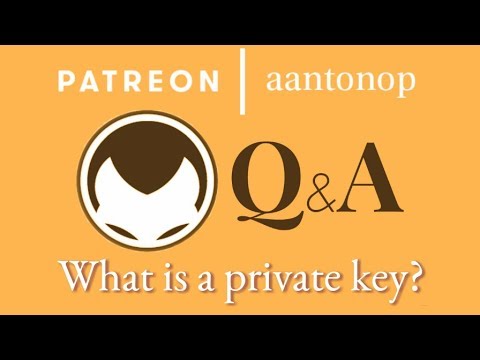What is a private key? How are they generated and formatted? Are private keys transmitted when you make a transaction? What are the chances of collision? Will quantum computing making it easy to guess private keys? Does implementing quantum-proof algorithms require an overhaul of the code?
Learn more from the following chapters of ‘Mastering Bitcoin’:
https://github.com/bitcoinbook/bitcoinbook/blob/f8b883dcd4e3d1b9adf40fed59b7e898fbd9241f/ch04.asciidoc
https://github.com/bitcoinbook/bitcoinbook/blob/f8b883dcd4e3d1b9adf40fed59b7e898fbd9241f/ch05.asciidoc
Key to address code: https://github.com/bitcoinbook/bitcoinbook/blob/35f1c62f192dd0eaf1b1c462f88a46e0f5942e16/code/key-to-address-ecc-example.py
These questions are from the MOOC 9.3 and 9.4 sessions, as well as the (rescheduled) April Patreon Q&A session, which took place on March 2nd, March 9th, and May 5th 2018 respectively. Andreas is a teaching fellow with the University of Nicosia. The first course in their Master of Science in Digital Currency degree, DFIN-511: Introduction to Digital Currencies, is offered for free as an open enrollment MOOC course to anyone interested in learning about the fundamental principles. If you want early-access to talks and a chance to participate in the monthly live Q&As with Andreas, become a patron: https://www.patreon.com/aantonop
RELATED:
Bitcoin: Where the Laws of Mathematics Prevail – https://youtu.be/HaJ1hvon0E0
Advanced Bitcoin Scripting Part 1: Transactions & Multisig – https://youtu.be/8FeAXjkmDcQ
Advanced Bitcoin Scripting Part 2: SegWit, Consensus, and Trustware – https://youtu.be/pQbeBduVQ4I
Cryptographic primitives – https://youtu.be/RIckQ6RBt5E
Nonces, mining, and quantum computing – https://youtu.be/d4xXJh677J0
Public keys vs. addresses – https://youtu.be/8es3qQWkEiU
Re-using addresses – https://youtu.be/4A3urPFkx8g
What happens to our bitcoins during a hard fork? – https://youtu.be/sNR76fWd7-0
How do mnemonic seeds work? – https://youtu.be/wWCIQFNf_8g
Multi-signature and distributed storage – https://youtu.be/cAP2u6w_1-k
What is Segregated Witness? – https://youtu.be/dtOjjB4mD8k
SegWit and fork research – https://youtu.be/OorLoi01KEE
Forkology: A Study of Forks for Newbies – https://youtu.be/rpeceXY1QBM
MimbleWimble and Schnorr signatures – https://youtu.be/qloq75ekxv0
Protocol development security – https://youtu.be/4fsL5XWsTJ4
Migrating to post-quantum cryptography – https://youtu.be/dkXKpMku5QY
Andreas M. Antonopoulos is a technologist and serial entrepreneur who has become one of the most well-known and respected figures in bitcoin.
Follow on Twitter: @aantonop https://twitter.com/aantonop
Website: https://antonopoulos.com/
He is the author of two books: “Mastering Bitcoin,” published by O’Reilly Media and considered the best technical guide to bitcoin; “The Internet of Money,” a book about why bitcoin matters.
THE INTERNET OF MONEY, v1: https://www.amazon.co.uk/Internet-Money-collection-Andreas-Antonopoulos/dp/1537000454/ref=asap_bc?ie=UTF8
[NEW] THE INTERNET OF MONEY, v2: https://www.amazon.com/Internet-Money-Andreas-M-Antonopoulos/dp/194791006X/ref=asap_bc?ie=UTF8
MASTERING BITCOIN: https://www.amazon.co.uk/Mastering-Bitcoin-Unlocking-Digital-Cryptocurrencies/dp/1449374042
[NEW] MASTERING BITCOIN, 2nd Edition: https://www.amazon.com/Mastering-Bitcoin-Programming-Open-Blockchain/dp/1491954388
Translations of MASTERING BITCOIN: https://bitcoinbook.info/translations-of-mastering-bitcoin/
Subscribe to the channel to learn more about Bitcoin & open blockchains!
Music: “Unbounded” by Orfan (https://www.facebook.com/Orfan/)
Outro Graphics: Phneep (http://www.phneep.com/)
Outro Art: Rock Barcellos (http://www.rockincomics.com.br/)
source











kindly reach out for @cyberblaze_bliz on IG he is pretty cool to help you recover your lost key and Bitcoin
SO YOUR TELLING ME CHRISTIANS HAVE THE BEST CHANCE OF CRACKING THE CODE??!!!!lol
What?
I have no idea what he said, but I watched the whole video ?
But, if the Public address is fundamentally used to receive bitcoins. And if the Private
key allows you to spend or transfer bitcoins stored at that address. Wouldn't
the Private key also become public knowledge and subject towards being hacked
?…
The bit where Andreas talks about guessing private key probabilities… mind melt. This guy’s wit is dry and razor sharp, love it, the guy is epic.
Mr. aantonop , I got my Mastering Bitcoin book around 6 months ago, I absolutely devoured it and had to leave a review! Jam-packed with clear information from the beginning to the end. Great work!
These numbers are crazy huge. Really blows the mind.
If the Public address is fundamentaly used to receive bitcoins. And if the Private key allows you to spend or transfer bitcoins stored at that address. Wouldn't the Private key also become public knowledge and subject towards being hacked ?…
There are 10^77 possible combinations of private keys…there are also around 10^77 atoms in the observable universe. 1 private key per atom. That's how big
All of the videos you put out are gold Andreas! Having you help beginners over and over again is so valuable to the crypto community. Your explanations really get the point across in a friendly way
But Bitcoin is dead. It died so many times it is just impossible it survived .. 😀
MATH ERROR in VIDEO: Isn't 10^77 / 10^9 = 10^68, not 10^65 as you say at around 8:45 of this video?
10:28 Zing! hahahaha
Question : Is is possible that two miners might complete a " proof of work " simultaneously ? If so who gets rewarded the "coin" ?
Love AA but would work much better with graphics/animation.
Move back, u r too close to the camera , jesus
Ending was lol
A few corrections: 10^77 is 10 with 76 zeroes after it, not 77. 10^77 / 10^9 is 10^68 not 10^65. Divide by another billion and it is 10^59, not 10^54, another billion is 10^50, not 10^43.
Thanks for the great video as always
These videos are so great, thanks for making them!
I'm going to translate all your videos into spanish, It's my small contribution to the bitcoin community. 🙂
Hi Andreas, Most of the times blockchain is referenced with respect to financial traction. Could you please help highlight its use case wrt to other applications like immutable database of say… land records or healthcare data ?
So many level 0 questions, ie quantum computers breaking private code, clearly humans need to read more before getting on the forum and typing away to glory. There should be some method of filtering questions like that do in stack overflow
11:03 That's the best quantum FUD busting I've heard. Thanks Andreas.
great video
The big question is, what is a public key? Asking for CryptoNick.
Damn your friken smart bro! Thank you for educating us ????
All I can say is thank you for being in bitcoin.
Love your common sense!
As always, thanks so much!
I wouldn't be surprised if it ever came out that Andreas is actually Satoshi
10:40 LMAO. Listen to the GOAT
16:38 haha. Nice
Best Line: In fact at this rate the amount of time it would take you to run through all private keys combinations exceeds the total time of the universe's existence, which depending on whether you apply science or not is either thirteen point four billion years or six thousand years!
Hey Andreas, a visual explanation of how to generate private and public keys by hand would be amazing. Would definitely help increase security!!!
I know it's very, veeery improbable. Billions of people with trillions of computers until the end of universe and time as we know. But from time to time I generate a single key and check if there are any funds.
Andreas getting yogi on us. LOL Namaste Andreas.
Thanks for this Q&A Aantonop…. The explanation you provide about guessing private keys at minute 9ish, is similar to one by 3blue1brown, and your viewers might be interested in watching this video on SHA256, https://youtu.be/S9JGmA5_unY
I'm glad that Andreas is not condecending with the original question
Great info – Thanks
I hope everyone understood that….LOL
way over my head but I watched anyway, i'm an oldie and close to death
CryptoNick taking notes
"I'm taking very very big numbers!"???
This is a great video that could be made even greater with some animated graphics to explain it visually.
10:10 was hilarious!
I love these videos so much
YouTuber aantonop = { "teacher'', 1," awesome"};
Can we fund someone to do diagrams and animations to these?
Smashed the like……..